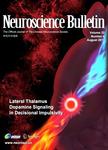Therapeutic Efficacy of Neurostimulation for Depression:Techniques, Current Modalities, and Future Challenges
Therapeutic Efficacy of Neurostimulation for Depression:Techniques, Current Modalities, and Future Challenges作者机构:Human Systems Lab Department of Biomedical Engineering and Sciences School of Mechanical and Manufacturing Engineering National University of Sciences and Technology (NUST)
出 版 物:《Neuroscience Bulletin》 (神经科学通报(英文版))
年 卷 期:2016年第32卷第1期
页 面:115-126页
核心收录:
学科分类:1002[医学-临床医学] 100205[医学-精神病与精神卫生学] 10[医学]
主 题:Depression Electroconvulsive therapyTranscranial direct current stimulation - Repetitivetranscranial magnetic stimulation ~ Magnetic seizuretherapy . Vagus nerve stimulation. Deep brainstimulation Treatment-resistant depression
摘 要:Depression is the most prevalent debilitating mental illness; it is characterized as a disorder of mood, cognitive function, and neurovegetative function. About one in ten individuals experience depression at some stage of their lives. Antidepressant drugs are used to reduce the symptoms but relapse occurs in ~ 20% of patients. However, alternate therapies like brain stimulation techniques have shown promising results in this regard. This review covers the brain stimulation techniques electroconvulsive therapy, transcranial direct current stimulation, repetitive transcranial magnetic stimulation, vagus nerve stimulation, and deep brain stimulation, which are used as alternatives to antide- pressant drugs, and elucidates their research and clinical outcomes.



